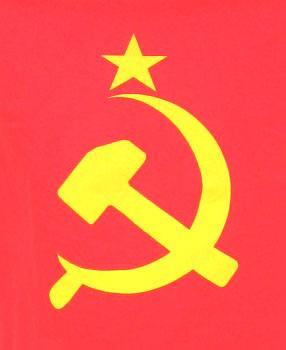"A form of government in which no one owns any land and everyone works towards the greater good."
Communism is a political and economic system which is characterized by the collective ownership of property (by the proletariat) and, furthermore, by the organization of labor for the common purpose of all members. Communism is similar to socialism, but contrasted with capitalism.
Although people popularly associate communism with the writings of Karl Marx, in fact the basic ideas behind it can be traced back much further. Among the earliest known writings on the subject is the Ancient Greek concept of a "Golden Age," a time of bliss and harmony without private property. Plato's ideal society was also one in which all property was held in common. It seems likely that the very earliest human tribes held much, if not all, property communally. sadly this failed do to the fact that people are greedy and goes against human nature.
"A form of government in which everyone is independent and works to support there own life style"
Laissez faire capitalism means the complete separation of economy and state, just like the separation of church and state. Capitalism is the social system based upon private ownership of the means of production which entails a completely uncontrolled and unregulated economy where all land is privately owned. But the separation of the state and the economy is not a primary, it is only an aspect of the premise that capitalism is based upon: individual rights. Capitalism is the only politico-economic system based on the doctrine of individual rights. This means that capitalism recognizes that each and every person is the owner of his own life, and has the right to live his life in any manner he chooses as long as he does not violate the rights of others.
In a capitalist, democratic nation such as the U.S., freedom gives us just about everything and anything that the Vietnamese do not have under their communist government. Contrary to what Karl Marx has written in his manifesto, the living people of a capitalist nation (i.e. USA) of today are more independent and possess more individualities than ever. Economic-wise, Americans are the most progressive people in the world. The U.S. government is not directing the flow of its economy, but the individual businesses of its people are. These people have all the rights in the world to improve their businesses, as long as they are conducting them under the legal guidelines of the government. Such freedom in a capitalist society gives the Americans much greater advantages over the Vietnamese in improving economic conditions.
In a communist nation, the judicial system can be very flexible at times. Crimes are rarely committed under such watchful eyes as the Communists, and the result of any crime would also be too harsh to bear. Safety is probably the best thing that the Communists can provide, but it can also be reversed anytime. By reversing, I mean that some people can also be convicted for not doing anything wrong. As long as someone (a local government cadre) possesses some sort of power, that person has all the right to convict you of anything that they want---yes, even without proof. On the other hand, the system also provides some safety to its people. Unlike in the U.S., crimes such as murdering, raping, robbing, and many others rarely or not even ever occur in communist Vietnam. People do not get away with them as easily as they do in America. There is no such thing as death row or parole in communist nations. Crimes are paid for immediately after they are convicted. Prisons do not have installed televisions nor nice beds for criminals. These prisoners have to earn the food that they eat by doing a certain amount of work for the time that they are sentenced to stay. Overall, the Communists1/4 judicial system works very well comparing to the one possessed by the Americans




